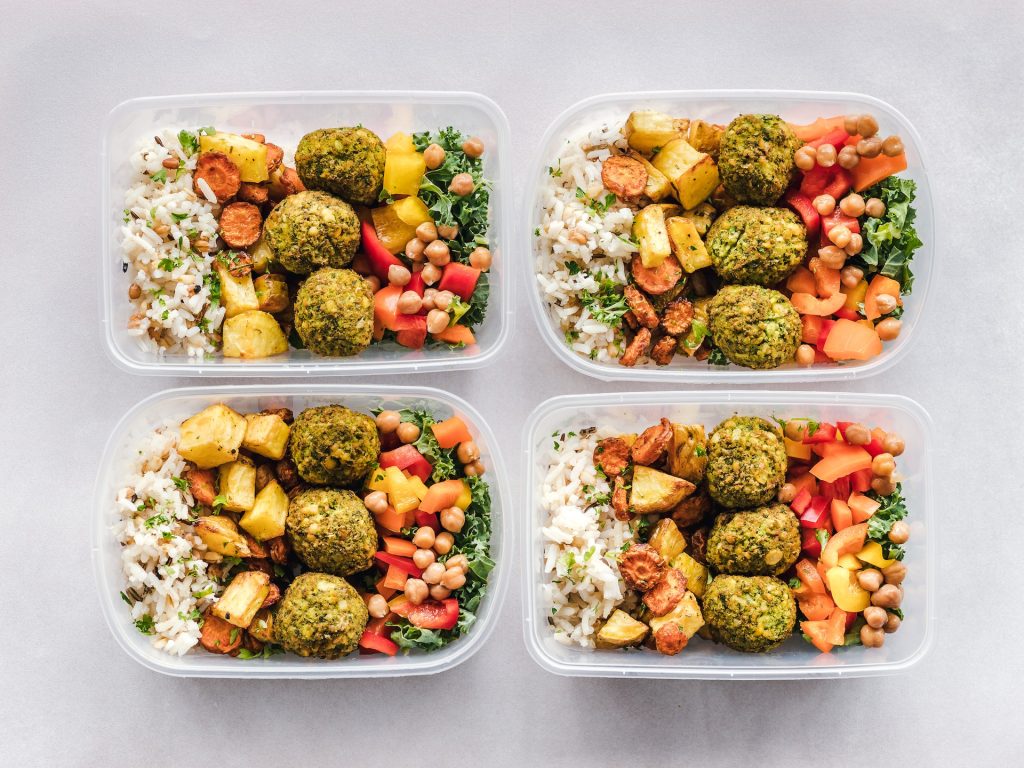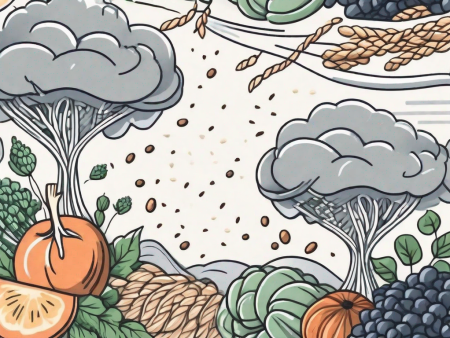Learn how a gluten-free diet can improve your sleep and alleviate insomnia symptoms.
Discovering the Benefits of a Gluten-Free Diet for Insomnia
Are you tired of counting sheep all night long, desperately trying to fall asleep? Well, it turns out that a gluten-free diet might just be the sleep solution you’ve been dreaming of! In this article, we’ll explore the fascinating world of insomnia and how a gluten-free diet can help you catch those elusive z’s.
Understanding Insomnia: Causes and Symptoms
First things first, let’s shed some light on insomnia. This sleep disorder can feel like a cruel prank, making it incredibly difficult to fall asleep or stay asleep. From stress and anxiety to caffeine and electronics, there are countless culprits behind your sleepless nights.
But fear not! With a little knowledge and a dash of gluten-free magic, you’ll be well on your way to a restful night’s sleep.

The Science Behind Sleep Disorders
Before we delve into how a gluten-free diet can help, let’s explore the science behind sleep disorders. Insomnia can be caused by a multitude of factors, including hormonal imbalances and disruptions in the sleep-wake cycle.
Our body’s internal clock, known as the circadian rhythm, plays a crucial role in regulating our sleep patterns. When this delicate balance is thrown off, insomnia can come knocking at your bedroom door.
Furthermore, research has shown that certain medical conditions, such as chronic pain, asthma, and allergies, can contribute to the development of insomnia. These conditions can cause discomfort and make it difficult for individuals to find a comfortable sleeping position.
In addition to medical conditions, environmental factors can also play a role in the development of insomnia. Noise pollution, extreme temperatures, and uncomfortable bedding can all disrupt sleep and contribute to the onset of insomnia.
Common Triggers of Insomnia
Now that we’ve unraveled the mystery of sleep disorders, let’s identify some common triggers of insomnia. Stress, oh sweet stress, can wreak havoc on our sleep. Whether it’s work deadlines or a never-ending to-do list, our minds often refuse to rest when under pressure.
Additionally, excessive caffeine consumption and late-night screen time can disrupt our sleep patterns, leaving us exhausted and irritable the next day.
But did you know that certain medications can also interfere with your sleep? Medications such as antidepressants, beta-blockers, and corticosteroids can have side effects that disrupt the sleep-wake cycle and contribute to insomnia.
Furthermore, it’s important to note that age can also play a role in the development of insomnia. As we get older, our sleep patterns naturally change, and we may find it more difficult to fall asleep and stay asleep throughout the night.
Lastly, it’s worth mentioning that certain lifestyle choices, such as irregular sleep schedules, lack of physical activity, and poor sleep hygiene, can all contribute to the development of insomnia.
The Gluten Connection: How Diet Affects Sleep
Now that we understand the ins and outs of insomnia, let’s shift our focus to the gluten connection. Gluten, a protein found in wheat, barley, and rye, has often been associated with digestive issues and inflammation.
However, recent studies have shed light on the impact of gluten on sleep patterns. It seems that this sneaky protein can actually disrupt our body’s sleep-regulating hormones, making it harder for us to drift off into dreamland.
The Role of Gluten in the Body
Gluten plays a crucial role in baking, giving bread its fluffy texture and pasta its satisfying chewiness. However, not all of us can handle gluten like champions. For some, gluten can trigger an immune response, leading to digestive discomfort, inflammation, and even sleep disturbances.
Imagine this: you’ve just had a delicious dinner of pasta with a side of garlic bread. Your stomach feels full and satisfied, but as you lay down to sleep, you find yourself tossing and turning. You can’t seem to find a comfortable position, and your mind is racing with thoughts. Little do you know, the culprit behind your restless night might just be the gluten lurking in your meal.
When gluten enters your body, it triggers an immune response that can cause inflammation in your gut. This inflammation can disrupt the delicate balance of hormones that regulate your sleep-wake cycle. As a result, falling asleep becomes a struggle, and staying asleep feels like an impossible task.
By eliminating gluten from your diet, you might just be saying goodbye to those restless nights once and for all. Imagine waking up feeling refreshed and energized, ready to take on the day ahead. It’s not just a dream; it can become your reality.
Gluten and Its Impact on Sleep Patterns
Some studies suggest that gluten can interfere with the production of melatonin, a hormone that regulates our sleep-wake cycle. When melatonin levels are disrupted, falling asleep and staying asleep can become a nightly battle.
Let’s dive deeper into the science behind this phenomenon. When you consume gluten, it can trigger an immune response in your body. This immune response releases inflammatory molecules that can cross the blood-brain barrier and interfere with the production of melatonin.
Imagine your brain as a finely tuned orchestra, with each hormone playing a specific instrument. Melatonin is the conductor, ensuring that each instrument plays in harmony to create a beautiful symphony of sleep. However, when gluten disrupts the production of melatonin, the orchestra falls out of sync. The result? A restless night filled with tossing and turning, instead of the peaceful slumber you deserve.
So, if you’re tired of staring at the ceiling while the rest of the world snoozes away, it might be time to bid farewell to gluten and embrace the gluten-free lifestyle. By removing gluten from your diet, you can restore the balance in your sleep-regulating hormones and finally experience the restful sleep you’ve been longing for.
Imagine drifting off into a deep sleep, feeling your body relax and your mind quieting down. Your dreams become vivid and enchanting, taking you on incredible adventures. And when you wake up in the morning, you feel rejuvenated, ready to seize the day with a newfound energy.
Don’t let gluten stand in the way of your dreams. Take control of your sleep and embark on a gluten-free journey towards a better night’s rest.
Transitioning to a Gluten-Free Diet
Now that we’ve established the gluten-sleep connection, let’s explore the essential steps to start a gluten-free diet.
Transitioning to a gluten-free diet can seem overwhelming at first, but with the right knowledge and preparation, it can be a smooth and enjoyable process. Here are some essential steps to help you get started:

Essential Steps to Start a Gluten-Free Diet
- First, familiarize yourself with foods that contain gluten. This includes obvious culprits like bread, pasta, and pastries, as well as sneaky sources like marinades and sauces. Gluten can hide in unexpected places, so it’s important to be aware of all the potential sources.
Did you know that some soy sauces contain gluten? It’s true! When shopping for gluten-free alternatives, make sure to look for tamari or gluten-free soy sauce options.
Additionally, be cautious when dining out or ordering takeout. Cross-contamination can occur in restaurant kitchens, so it’s always a good idea to ask about gluten-free options and how they prepare their dishes.
- Next, stock up on gluten-free alternatives. Thankfully, the gluten-free market has expanded in recent years, offering delicious options like quinoa, rice, and almond flour. These alternatives can be used in a variety of recipes, from baking to cooking.
When it comes to baking, experimenting with gluten-free flours can be both fun and rewarding. You’ll discover a whole new world of flavors and textures that can rival their gluten-containing counterparts.
Remember to always check the labels of gluten-free products to ensure they are certified gluten-free and not processed in facilities that also handle gluten-containing ingredients.
- Don’t forget to check food labels carefully. Gluten can hide in unexpected places, so be a gluten detective and read those ingredient lists! Ingredients like malt, barley, and rye are all sources of gluten.
It’s also important to be aware of cross-contamination risks. Some products may be labeled gluten-free but could have come into contact with gluten during manufacturing or packaging. Look for products that are certified gluten-free to minimize this risk.
If you’re unsure about a particular ingredient or product, don’t hesitate to reach out to the manufacturer for clarification. They can provide valuable information to help you make informed choices.
- Finally, embrace the wonderful world of gluten-free recipes. From mouthwatering gluten-free pizza to delectable pasta dishes, the possibilities are endless!
Exploring gluten-free recipes can be an exciting adventure. You’ll discover new ingredients, flavors, and cooking techniques that will make your gluten-free journey even more enjoyable.
There are numerous online resources, cookbooks, and blogs dedicated to gluten-free cooking. These valuable sources of inspiration will help you create delicious meals that are safe and satisfying.
Gluten-Free Foods to Incorporate into Your Diet
- Start your gluten-free journey with a rainbow of fruits and vegetables. Not only are they packed with essential nutrients, but they’ll also add vibrant flavors to your gluten-free creations. From juicy strawberries to crisp bell peppers, let your taste buds dance with delight!
Fruits and vegetables are naturally gluten-free and can be enjoyed in a variety of ways. Whether you prefer them raw, cooked, or blended into smoothies, they are a fantastic addition to any gluten-free diet.
Experiment with different combinations and flavors to create refreshing salads, hearty stir-fries, and nourishing soups. The possibilities are endless!
- Explore the wonderland of gluten-free grains, such as quinoa, buckwheat, and amaranth. These versatile grains can be the foundation of hearty salads, comforting porridges, and delightful risottos – all gluten-free, of course!
Quinoa, in particular, is a powerhouse of nutrition. It is rich in protein, fiber, and various vitamins and minerals. Incorporating quinoa into your meals will not only add a delightful nutty flavor but also provide you with essential nutrients.
Don’t be afraid to experiment with different gluten-free grains and incorporate them into your favorite dishes. You’ll be amazed at the variety and depth of flavors they can bring to your gluten-free table.
- Don’t forget the protein! Lean meats, such as chicken and turkey, along with beans, legumes, and tofu, are excellent gluten-free sources of this essential macronutrient.
Protein is an important component of a balanced diet, and there are plenty of gluten-free options to choose from. Whether you prefer animal-based proteins or plant-based alternatives, you can find a wide range of gluten-free options to suit your dietary needs.
Experiment with different cooking methods and seasonings to create delicious and protein-packed meals. From grilled chicken skewers to hearty lentil stews, there’s no shortage of gluten-free protein options to explore.
- Last but certainly not least, indulge your sweet tooth with gluten-free treats. From sinfully delicious dark chocolate to melt-in-your-mouth macarons, there’s a world of gluten-free desserts waiting to be savored.
Contrary to popular belief, a gluten-free diet doesn’t mean giving up on desserts. With the availability of gluten-free flours and baking mixes, you can recreate your favorite sweet treats without compromising on taste or texture.
Get creative in the kitchen and experiment with gluten-free baking. From fluffy gluten-free pancakes to decadent gluten-free brownies, you’ll be amazed at the delicious results you can achieve.
Remember to always check the labels of pre-packaged gluten-free desserts to ensure they are certified gluten-free and safe for consumption.
The Potential Benefits of a Gluten-Free Diet for Insomnia
Now that you’re armed with a gluten-free arsenal, let’s dig into the potential benefits for your precious sleep.
Improved Sleep Quality
By eliminating gluten from your diet, you may experience improved sleep quality. With reduced inflammation and a happier digestive system, your body will be primed for a peaceful slumber.
Imagine waking up feeling refreshed, rejuvenated, and ready to tackle the day – that’s the powerful impact of a gluten-free diet on your sleep!
Increased Energy Levels
We’ve all experienced those dragging mornings after a sleepless night. The good news? A gluten-free diet can help boost your energy levels. By nourishing your body with gluten-free foods rich in nutrients, you’ll have the vigor and vitality to conquer any challenge that comes your way!
Addressing Common Concerns and Misconceptions
Now, before we wrap up this gluten-free sleep journey, let’s address some common concerns and debunk a few myths.
The Challenge of Maintaining a Balanced Diet
Some people worry that transitioning to a gluten-free diet may lead to nutritional deficiencies or a limited food selection. But fear not! With proper planning and a wide variety of gluten-free alternatives, you can maintain a balanced and exciting diet.
So flex those culinary muscles, explore new flavors, and embrace the boundless opportunities of the gluten-free world. Your taste buds and your body will thank you!
Debunking Myths about Gluten-Free Diets
There are plenty of myths surrounding gluten-free diets. Some believe that a gluten-free diet is only for individuals with celiac disease, a severe gluten intolerance. However, gluten sensitivity exists on a spectrum, and many individuals may benefit from reducing or eliminating gluten from their diets.
Remember, a gluten-free diet isn’t just a trend. It’s a choice that can transform your relationship with sleep and contribute to overall well-being.
So there you have it – the gluten-free secret to a good night’s sleep. It’s time to bid farewell to those sleepless nights and say hello to a restful slumber.
Are you ready to embrace the gluten-free lifestyle and discover a world of better sleep? Your dreams are waiting, so grab that loaf of gluten-free bread, dive into a gluten-free cookbook, and embark on this gluten-free sleep adventure!







